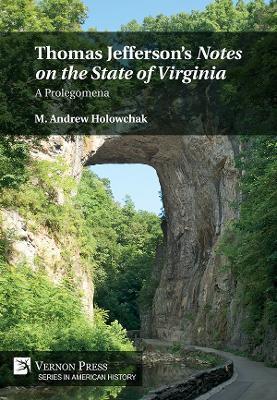Thomas Jefferson's 'Notes on the State of Virginia': A Prolegomena

Thomas Jefferson's 'Notes on the State of Virginia': A Prolegomena
Why did Jefferson write 'Notes on the State of Virginia'? There are today two common theses. The first, the Alphabet-Soup Thesis, maintains that the book is more or less a loose collection of notes in answer to the 22 queries given by French diplomat François Barbé-Marbois. Jefferson's altering the arrangement of his answers to the questions is a matter of allowing for a smoother "narrative" for his answers, but other than that, one ought to be cautious not to read too much into his restructuring. The second, the Deconstructionist Thesis, is that meticulous deconstruction of the text reveals a latent thesis, which Jefferson, consciously or subconsciously, kept from his readers. Both views are problematic. The former cannot explain why Jefferson fell so deeply into the project, rearranged Marbois' questions so that the book would flow smoothly from nature to culture, and continually revise his often-lengthy answers, even after the Stockdale edition in 1787. The latter suffers from the fact that Jefferson tended never to write elliptically.
"Thomas Jefferson's 'Notes on the State of Virginia': A Prolegomena" is an attempt to provide an alternative, "dialectical" reading to current interpretations of the book. The book, Holowchak asserts, is neither a simple omnium gatherum nor is its message accessible only through deconstruction. There is an obvious movement from nature (Gr., 'phusis') in the first seven queries to culture (Gr., 'nomos') in the remaining 16 queries, but that "movement" is not linear. Early naturalistic queries set up neatly Jefferson's discussion of the cultural aspects of Virginia, and Jefferson's explication of the cultural aspects of Virginia cannot be grasped without frequent returns to the naturalistic queries, hence its dialectic. Jefferson's aim overall, sums Holowchak, is the appropriation of what nature had given for humans' use-to perfect the social state by taming nature and putting it to use for human betterment.
PRP: 594.72 Lei
Acesta este Prețul Recomandat de Producător. Prețul de vânzare al produsului este afișat mai jos.
535.25Lei
535.25Lei
594.72 LeiLivrare in 2-4 saptamani
Descrierea produsului
Why did Jefferson write 'Notes on the State of Virginia'? There are today two common theses. The first, the Alphabet-Soup Thesis, maintains that the book is more or less a loose collection of notes in answer to the 22 queries given by French diplomat François Barbé-Marbois. Jefferson's altering the arrangement of his answers to the questions is a matter of allowing for a smoother "narrative" for his answers, but other than that, one ought to be cautious not to read too much into his restructuring. The second, the Deconstructionist Thesis, is that meticulous deconstruction of the text reveals a latent thesis, which Jefferson, consciously or subconsciously, kept from his readers. Both views are problematic. The former cannot explain why Jefferson fell so deeply into the project, rearranged Marbois' questions so that the book would flow smoothly from nature to culture, and continually revise his often-lengthy answers, even after the Stockdale edition in 1787. The latter suffers from the fact that Jefferson tended never to write elliptically.
"Thomas Jefferson's 'Notes on the State of Virginia': A Prolegomena" is an attempt to provide an alternative, "dialectical" reading to current interpretations of the book. The book, Holowchak asserts, is neither a simple omnium gatherum nor is its message accessible only through deconstruction. There is an obvious movement from nature (Gr., 'phusis') in the first seven queries to culture (Gr., 'nomos') in the remaining 16 queries, but that "movement" is not linear. Early naturalistic queries set up neatly Jefferson's discussion of the cultural aspects of Virginia, and Jefferson's explication of the cultural aspects of Virginia cannot be grasped without frequent returns to the naturalistic queries, hence its dialectic. Jefferson's aim overall, sums Holowchak, is the appropriation of what nature had given for humans' use-to perfect the social state by taming nature and putting it to use for human betterment.
Detaliile produsului










